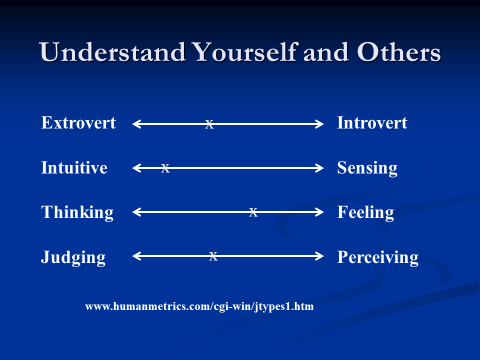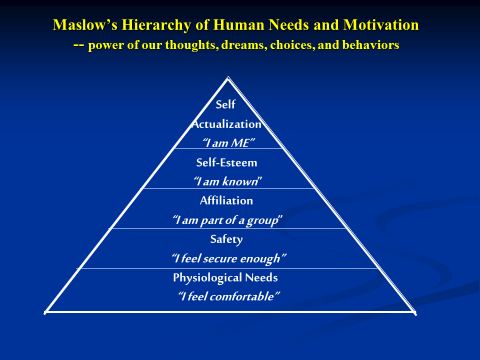
Understand Yourself and Others
– Musings of Dr. Jamie Hsu, 11.30.2016
It may seem trivial, but have you considered how well you know yourself? You’ll be surprised at the answer. We may know our preferences and reactions, but often times we don’t really know why. It is even harder to figure out why others behave differently from ourselves.
If you don’t know your own personality, strengths, weaknesses, and idiosyncrasies, how can you be a good team member? If you don’t know what motivates people, how do you work with them, lead them, or convince them with the right sales pitch?
Try to take one of the many personality surveys available online or in books to identify your personality type. See the example illustrated in the accompanying chart: the Myers Briggs EI, NT, FS, PJ Types. You will find out more about yourself — what turns you on and off, and how you would react to various situations. You will also find out more about your spouse and your co-workers. Given the same situation and the same facts, they may react very differently from you. It is not because they are trying to be difficult. They just may see and feel things you don’t. Personalities can vary greatly and cause various beliefs and behaviors. That is why diversity and inclusiveness is so valuable in a team setting.
To understand the basic human needs, one can study the excellent and extensive research done on this topic. A classical one is Maslow’s Hierarchy of Human Needs. In general, human beings need to satisfy basic physiological and safety requirements before they will pay attention to the higher levels of “sense of belonging” and “esteem.” You can see many businesses, products, and services trying to satisfy these various needs. Food, insurance, Facebook, fashion, and charity are some good examples.
Do you really know yourself, your loved ones, your colleagues, and your customers? I highly recommend you read a few books on this, or at least do a thorough Google search. You will be amazed at the richness of such research. Please make the best of it. Start to build the foundation for your success in career and life.


你,了解自己嗎?
-作者 許俊宸博士
-中譯 薛乃綺
我們跟自己生活了一輩子,應該是最瞭解、最懂自己的人。這也許是件枝微末節的小事,但有個答案卻出乎你的意料之外–那就是我們可能會知道自己的喜好與反應,卻往往不知道為什麼、甚至很難理解為何別人的行為跟我們為什麼不同。
如果你不知道自己的個性、強項、弱點、特質,那你如何能成為一個好的成員?如果你不知道什麼能夠激勵一個人,那你如何跟別人合作、領導他人、或者讓人覺得你很有說服力?
網路上或坊間書籍有提供許多性向測試的方法,可以嘗試用其中一種來看看你自己是屬於哪一種類型。如範例圖中的是MBTI測試,它將人的認知分為四種:是外向(E)還是內向(I)?是實感(S)還是直覺(N)?是理性(T)還是感性(F)?是断定型(J)還是感知型(P)?
你會發現更多關於自己的事情,包括什麼事情會讓你開心或掃興、以及你對各種狀況會有怎樣的反應。這些對於你的另一半或同事也是同樣的道理。當面對相同的情況、相同的事情,他們的反應也許跟你有很大的不同。並非是他們要跟你不一樣,而是他們看到或感受到的,也許跟你有所不同。可以說,每個人的個性都不相同、也因此導致有不同的信念和不同的行為模式。
為了理解人類的基本需求,我們可以從很多很棒的研究報告中,學習到關於這個議題的知識。最經典的,就是馬斯洛的人類需求五層次理論。人類通常需要滿足基本生理和安全要求,才能注意到更高層次的歸屬感和尊重的需求。你可以看到許多行業、產品、服務,都是為了滿足這些各式各樣的不同需求而存在的。像是食品、保險、Facebook、時尚、慈善等,就是很好的例子。
你真的”暸解”你自己?你所愛的人?你一起共事的人?甚至是你的客戶嗎?我強烈建議你可以先閱讀一些相關書籍,或者至少先徹底的Google一下關鍵字。你會驚訝這類的研究議題居然已如此豐富。你應該好好的用它,並開始為你的職涯奠定成功的基礎。


